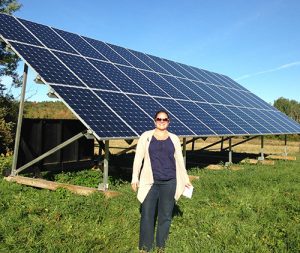Let the sun shine in: Developing tools for community solar in Maine
Interdisciplinary researcher Sharon Klein helps people and communities weigh their energy options.
March 2021
 When Sharon Klein interviewed for her faculty position in the University of Maine’s School of Economics, one of the questions she was asked was, ‘How would you apply your research to Maine issues?’ Her doctoral research focused on large-scale solar energy efforts—projects that work well in places with wide open spaces and lots of sun.
When Sharon Klein interviewed for her faculty position in the University of Maine’s School of Economics, one of the questions she was asked was, ‘How would you apply your research to Maine issues?’ Her doctoral research focused on large-scale solar energy efforts—projects that work well in places with wide open spaces and lots of sun.
In short—not Maine.
What Maine does have, however, is a history of small-scale, grassroots solar energy projects adopted by individuals and communities. Sharon quickly became interested in what’s called “community solar”—a relatively recent movement across the U.S. that’s catching on rapidly and can take different forms. It typically involves utilities or private developers implementing shared “solar farms” and soliciting subscriptions from residents of a specific utility territory to participate (“top-down” community solar). However, much of Sharon’s work now focuses on projects that are developed at the community level (“grassroots” community solar). This community-based approach is less common than the top-down models in the U.S. but has been active in Maine for years. Examples might be a town adding solar panels to the roof of its municipal building, or a community group developing a solar farm that’s collectively owned.
Putting passion into practice
Sharon’s research and teaching are interdisciplinary in nature, centering on the technical, economic, environmental, and social tradeoffs inherent in sustainable energy decision-making, including solar and other forms of renewable energy.

As part of the work she’s done since coming to UMaine, including a project that received Mitchell Center seed grant funding, she and her colleagues created the first U.S. Community Renewable Energy Database – a central location for sharing information on community-based renewable energy projects. She’s also collaborated with organizations such as Window Dressers on projects that engage students in community-based energy efficiency efforts.
Her research has become more focused on community solar over the past several years and she has been a member of the National Community Solar Partnership (NCSP) since 2015. She’s now part of a working group within the NCSP that’s focused on creating tools and other resources to assess the multifaceted costs and benefits of grassroots community solar.
Sharon’s “personal passion” is for solar research, and she’s also dedicated to teaching and mentoring students and to serving communities. She’s developed ways to integrate service learning in her courses to give students opportunities to “do sustainable energy research that matters.” She continuously expands her network of organizations that students are working with, including the National Renewable Energy Laboratory, the Maine Governor’s Energy Office, and the city of Bangor—to name just a few.
Finding the right fit
Many states, municipalities, and organizations are setting ambitious goals for switching to solar and other renewable energy sources—a crucial part of responding to climate change and reducing greenhouse gas emissions.
Sharon works closely with diverse community partners, including A Climate to Thrive on Mount Desert Island, the city of Bangor, and the Penobscot Nation. Her work with these partners has made it clear that as renewable energy technologies expand, and commitments to adopt renewable energy get more ambitious, one of the missing pieces of the picture is how people, organizations, and communities make decisions about what solutions might work best for them.
“I keep getting feedback from different communities that they don’t know where to start, they don’t know how to navigate this landscape,” she says. “How are they making decisions about what to do in that space? What information are they using? What kinds of analytical tools do they need to help make those decisions?”
To help communities address these challenges, she is also drawing on tools she developed as part of the Mitchell Center’s Future of Dams project. In that work, Sharon and her Ph.D. student Emma Fox used Multi-Criteria Decision Analysis (MCDA) as a framework to help diverse stakeholders examine tradeoffs around renewable energy in a transparent and balanced way. “My goal for the future with community solar is to develop a stakeholder-engaged MCDA tool for grassroots community solar approaches that people can use in decision-making.”
Putting the community in community solar
 Working together on community-based energy projects, she says, can help people “foster a sense of pride and resilience” as well as help to develop new norms about energy production and use that are more sustainable.
Working together on community-based energy projects, she says, can help people “foster a sense of pride and resilience” as well as help to develop new norms about energy production and use that are more sustainable.
Public awareness of community solar is growing, and in Maine an expanding set of models is emerging since the 2019 repeal of state legislation that limited the size of community solar projects. Given these developments, Sharon’s work is more relevant than ever before. In January, research by Sharon and colleagues that analyzes different community solar approaches, including in Maine, was published in the journal Solar Energy.
To help raise awareness of community solar opportunities, she will give a talk on March 15 as part of the Mitchell Center’s Sustainability Talks series. She hopes her talk will help people become aware of the many options and factors to consider, as well as what questions remain about community solar. She also wants to inspire people to act in their individual lives and in their communities.
“People want to be part of the solution,” she says, “not part of the problem.”
